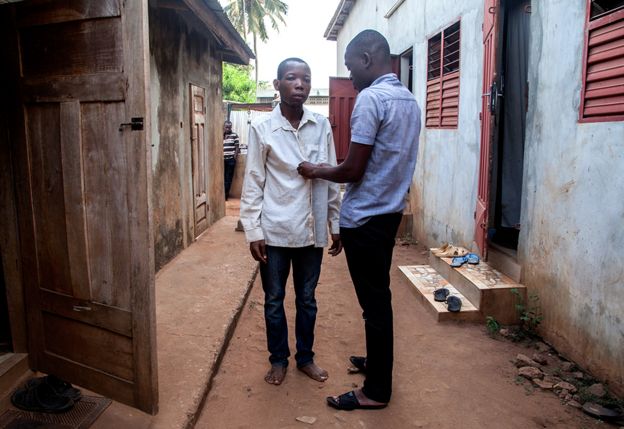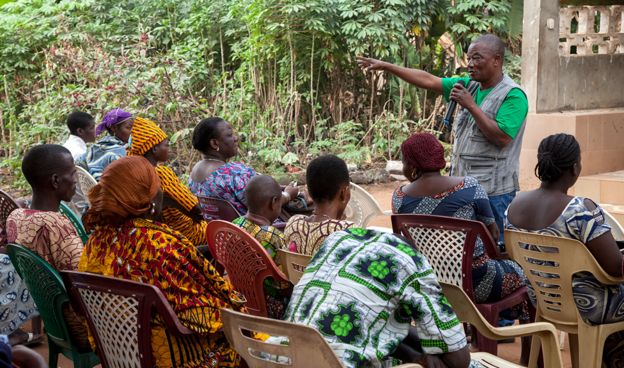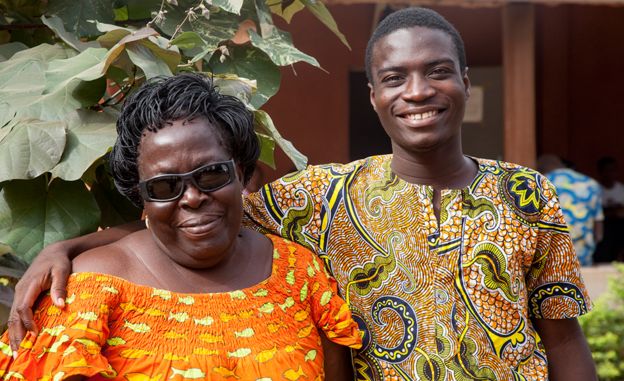For almost 30 years, Gregoire Ahongbonon, a former mechanic from Benin, has helped thousands of West Africans affected by mental illnesses, caring for them in residential centres run by his charity, the Saint Camille association. Above all else, he is determined to stop the practice of keeping mentally ill people in chains.
Aime has just come out of his room. He is taking tiny steps - his ankles held in leg irons.
The scene takes place in a small house in the city of Calavi, on the outskirts of Cotonou, the capital of Benin. Aime, 24, has a mental illness and his elder brother and sister have been looking after him to the best of their abilities.
"We've had to lock him up because he disturbs people and they come to our house to complain," says his brother, Rosinos.

"Sometimes he even attacks people in the street saying they've stolen something. He can't stop screaming, day or night. He can't sleep, so neither do we. I'm so overwhelmed by all this."
The family could not afford for Aime to be treated at the country's only state-run mental health institution, the Jacquot Public Hospital, where fees start at 20,000 CFA francs per month, almost half the average salary. Instead they gave him medication prescribed by the hospital - but after eight months they could no longer afford that either.
Aime had become calmer, but without treatment his illness quickly returned. Rosinos and his sister, Edmunda, were in desperation when Edmunda went to a lecture by Gregoire Ahongbonon, campaigning against the stigmatisation of mental illness.

Afterwards Edmunda asked Ahongbonon for advice, and Aime is now being taken to a centre run by the Saint Camille association in Calavi.
The association has more than a dozen centres across Ivory Coast, Benin, Togo, and Burkina Faso. They care for thousands of patients and charge very little.
Ahongbonon and his staff find homeless people, thrown out on to the street by their families, and give them a home. They also travel across West Africa on alert for reports of mentally ill people shackled or mistreated in remote villages. When they find such people they offer to take them in.
"Mental patients here are seen as possessed by the devil or victims of witchcraft," says Ahongbonon.
"That's the case in Africa in general, but in Benin it's even worse, because Benin is the home of voodoo, so it's even stronger here."
In Benin, when someone becomes ill, the family's first instinct is often to take the patient either to a traditional healer or to evangelical churches that claim they can heal the patient by praying for his soul.
When Pelagie Agossou's grandson, Judikael, became ill, friends encouraged her to take him to a church to have the "evil spirits" cast out. She rejected this advice, but tried just about everything else, including a traditional healer.

Judikael's problem was a form of schizophrenia, in which he heard voices telling him to take his clothes off and run out of the house.
"Once, after my child had run away from home yet, again a girl came and told me Judikael was wondering around the city in his underwear," says Agossou.
"So I dashed there but when he saw me he started to run… I ran after him and people started to chase him too, thinking he was a thief. And I was shouting 'No don't hurt him, he's my child.' I was so scared that the police would hurt him thinking that he was a thief."
She tried taking him to a private clinic but it was too expensive, and it was at this point that she visited a traditional healer, where she paid 80,000 CFA francs (£93) for a medicine that had no effect.